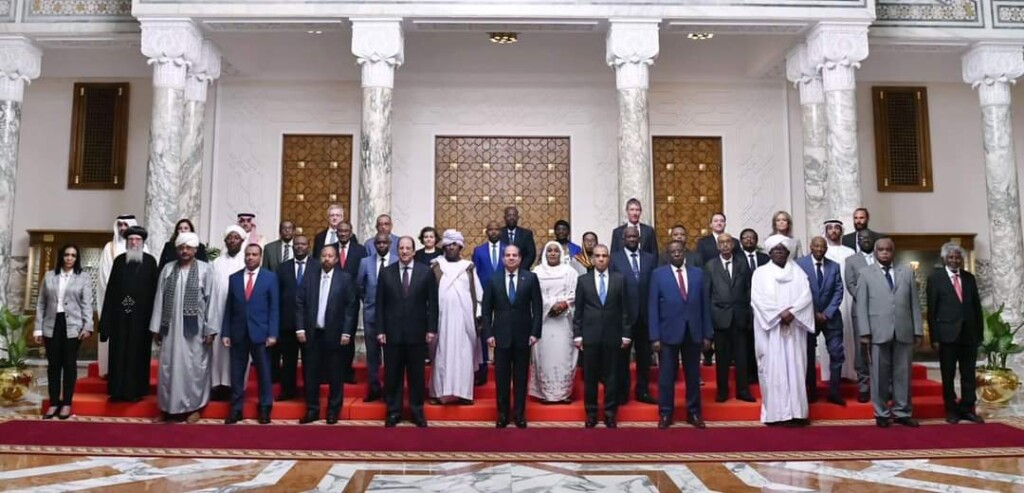Cairo conference on Sudan war reaps ‘mixed results’

Delegates at the Cairo conference (Photo: Egyptian govt)
The Conference of Sudanese Political and Civil Society Forces concluded in Cairo on Saturday, focusing on current political issues in Sudan, ways to end the war, delivering humanitarian aid, protecting civilians, and exploring opportunities for comprehensive peace. This included initiating a political process leading to a transitional phase under the slogan Together to End the War. Radio Dabanga spoke with Esam Shaaban, political affairs researcher, and journalist Khalid Mahmoud about the impact of this conference.
As anticipated, the Sudanese parties failed to reach an agreement to unify their positions on resolving the crisis due to disagreements. Some forces, particularly the armed rebel movements that signed the Juba Peace Agreement (JPA), such as the Sudan People’s Liberation Movement-North faction led by Malik Agar, deputy chair of the Sovereignty Council, the Justice and Equality Movement faction led by Finance Minister Jibril Ibrahim, and the Sudan Liberation Movement faction led by Minni Minnawi, governor of Darfur, refused to sign the final statement.
The Egyptian authorities are aware of disputes among the Sudanese parties and their potential impact on the conference and further. Nevertheless, Cairo has a pressing interest in two main objectives: addressing the Sudanese crisis and safeguarding its own interests and concerns. As the conflict between the Sudanese Armed Forces (SAF) and Rapid Support Forces (RSF) continues to expand throughout the country, the question is whether this counts as a failure, and whether Cairo or Sudanese political parties bear responsibility.
Partial success
Researcher Esam Shaaban told Radio Dabanga that “the Cairo conference partially succeeded by creating a space for discussion and enhancing dialogue among political forces. To stop the war, both sides must cease using weapons to gain power”.
Shaaban believes Cairo will continue its mediation efforts, as neither side can decisively win the conflict. He added, “The conference is a gateway for humanitarian aid, addressing refugee issues, and potentially involving neighbouring countries, Egypt, and international and regional organisations in reconstruction. After civil wars, the key question is what the state should aim for.
“Parties with vested interests in the war claim the conference failed, as they benefit from its continuation. Supporters of both SAF and the RSF echo this sentiment, as they prefer not to engage in a multi party-political dialogue and project their desired image, leading their supporters to declare the conference a failure,” the researcher added.
“Some view the conference as a failure due to Cairo’s ambivalent positions on the Sudanese revolution and certain political factions,” Shaaban explained. “Cairo’s cautious stance fuels suspicion about its genuine interest in political dialogue versus pursuing its own interests. Cairo sees the war as detrimental, affecting border security with Sudan and Libya and the Red Sea’s security. This view allows for interventions that could harm Cairo’s diplomatic and political influence”.
Additionally, the researcher highlighted that other parties’ involvement in mediation diminishes Egypt’s diplomatic capabilities. Egypt, linked to international parties, aims to showcase its role in managing dialogue among Sudanese factions. Regional and African competition drives scepticism towards Egyptian initiatives. The researcher believes Cairo can reissue another invitation for a conference to continue the dialogue and encourage regional powers to focus on dialogue rather than escalating the conflict.
Jeddah or Cairo
Commenting on speculation that Egypt aimed to create an alternative to Jeddah by hosting the conference, journalist Mahmoud says, “Egypt’s political leadership plans to align with Jeddah, not replace it. Jeddah serves as a regional and international platform for fostering consensus among various parties”.
Shabaan says that Egypt’s intervention in the Sudanese issue enhances its mediation role by leveraging relationships with Washington and the European Union. Egypt’s understanding with Riyadh indicates cooperation, focusing on dialogue rather than rivalry. The researcher added, “Cairo also engages with the UAE, suggesting that current moves are part of a dialogue among the three, particularly with Riyadh, rather than a confrontation or competition”.
Official entities
Regarding Egypt’s engagement with political forces, including the Civil Democratic Forces alliance (Tagadom), which might anger Port Sudan, Mahmoud asserted that Egypt is not neutral. The contradictions in Egypt’s role stem from its commitment to a centralised state, crucial in its decision-making. Mahmoud explained, “Egypt’s policy typically deals with state authority in Sudan, regardless of its nature, democratic or not. However, the presence of Islamists complicates Egyptian decision-making.” Mahmoud believes the Sudanese government will never fully align with the Egyptian government, always maintaining suspicion regarding Sudanese Islamists. Thus, not every Egyptian decision will be satisfactory.
Shaaban noted that Egypt prefers dealing with official entities and avoids engaging with militias. There is a clear difference in handling the head of the Sovereignty Council, Abdelfattah El Burhan, and RSF leader, Mohamed ‘Hemedti’ Dagalo. Shaaban emphasised: “There is an awareness of the danger posed by militias or non-state organisations. This cautious approach is evident in Cairo’s interactions with political formations across the Arab region, especially in countries that have experienced conflicts or civil wars”.
Hosting Hemedti
Regarding the possibility of inviting Hemedti to future conferences, Shaaban considered it necessary for negotiations. Mahmoud partially agreed but suggested it depends on the emerging space between SAF and RSF. He noted that neither Cairo nor any other party has definitive means of pressure, with even global powers like the US lacking decisive influence.
Journalist Khalid Mahmoud stated, “If the United States cannot exert decisive pressure, it is doubtful that Egyptian authorities can bridge the gap between the conflicting parties. This possibility hinges on the field situation and each party’s perception of their potential military gains”.
Further adding that comment by El Burhan claiming that “the fall of cities does not equate to defeat,” indicate his preference to improve his military position before engaging in political initiatives. Without a clear military resolution, rapprochement remains unlikely. In this context, Mahmoud stated that Egyptian authorities could play a role but would be part of a broader international effort rather than a decisive force.











 and then
and then